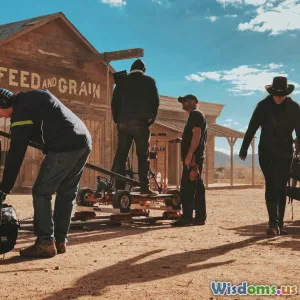
Navigating the World of Film Festivals
9 min read Unlock the secrets of film festivals and boost your filmmaking journey with expert tips and insider insights. (0 Reviews)
Navigating the World of Film Festivals: A Filmmaker's Guide
Introduction
Imagine premiering your latest film to an audience filled with industry professionals, critics, and passionate cinephiles. Film festivals aren’t merely showcases; they are vibrant ecosystems where creativity, opportunity, and storytelling converge. Yet, for many filmmakers, entering and thriving within this world can feel like navigating a labyrinth. How do you choose the right festivals? What makes a submission stand out? And, most importantly, how do you leverage film festivals to advance your filmmaking career?
This comprehensive guide dives deep into the world of film festivals. Whether you’re a first-time filmmaker aiming to make your mark or an experienced creator looking to maximize exposure, we'll explore every crucial aspect—from strategic submissions to networking and promoting your work.
Understanding the Landscape of Film Festivals
Film festivals come in myriad forms: from globally renowned giants like Cannes, Sundance, and Toronto International Film Festival (TIFF), to niche events celebrating genres, cultures, or emerging voices.
Types of Festivals
-
Top-Tier Festivals: These are highly competitive, internationally recognized, and can greatly boost a filmmaker’s profile. Screenings here often lead to distribution deals and critical acclaim. For instance, Jordan Peele’s Get Out debuted at Sundance, helping secure distribution with Universal Pictures.
-
Regional and Niche Festivals: Catered towards specific genres – horror (e.g., Screamfest), documentary (e.g., IDFA), or regional storytelling. These festivals offer more accessible platforms with focused audiences.
-
Online Festivals: Gaining traction with the rise of digital media, these allow submissions and screenings entirely online, expanding reach without geographical limitations.
Why Festivals Matter
-
Exposure: Festivals place films in front of diverse audiences and industry insiders.
-
Feedback: Q&As and critiques offer invaluable feedback.
-
Networking: They provide direct connections to producers, distributors, and fellow filmmakers.
-
Awards and Credibility: Winning awards can shine a spotlight on your project, opening doors.
A 2019 survey by the Independent Filmmaker Project found that over 60% of successful indie filmmakers cited festival exposure as key in securing funding for subsequent projects.
Crafting a Festival Submission Strategy
Navigating film festivals begins with a strong submission plan. Submitting randomly rarely yields success; thoughtful targeting is essential.
Research and Selection
Avoid a scattergun approach by researching each festival’s themes, audience, and acceptance rates. Use platforms like FilmFreeway and Withoutabox to browse festival catalogs.
For example, if your film champions environmental activism, submitting to festivals like Green Film Fest or Environmental Film Festival in the Nation’s Capital improves relevance and likelihood of selection.
Entry Requirements & Deadlines
Each festival has specific rules: runtime limits, premiere status, and technical formats. Missing deadlines or submitting the wrong format can disqualify your film. Set a calendar with all important dates months ahead.
Crafting Your Submission
-
Synopsis and Statement: Write clear, compelling synopses highlighting your film’s unique elements. Many programmers read hundreds of entries, so clarity is key.
-
Press Kit: Include director’s bio, production notes, photos, and previous accolades where relevant.
-
Trailer and Still Images: High-quality, professional materials can capture interest even before viewing.
Film editor and festival consultant Kendra Thompson advises, “Make sure your submission materials embody your film’s soul. This is your first impression.”
Budgeting for Fees
Festival submissions often come with entry fees, which vary widely—from $20 to $100+. Budget accordingly and consider the return on investment.
Maximizing Your Festival Experience
Getting your film selected only marks the beginning. How you navigate and capitalize on the festival can propel your filmmaking career.
Preparing for Screenings
Attend festivals in person whenever possible. Engaging directly with viewers and peers enriches experience. Prepare to participate in Q&A sessions confidently—anticipate questions about inspiration, production process, and challenges.
Networking and Relationship Building
Festivals are networking goldmines. Schedule meetings with distributors, producers, and journalists. For instance, Tribeca Film Festival’s industry events are designed for these interactions.
Successful filmmaker Ava DuVernay noted, "Film festivals opened doors not just for my films, but for meaningful professional relationships that shaped my career." Don’t hesitate to exchange contact info and follow up after.
Marketing and Social Media
Leverage social platforms before, during, and after your festival screenings. Live-tweet events, share behind-the-scenes content, and foster online community engagement.
Data shows that films with active social engagement see increases in post-festival distribution deals by up to 30%.
Handling Rejection and Acceptance
Rejection is common—even celebrated movies face it. For example, Pulp Fiction was rejected by some festivals but found success elsewhere. Persistence and timing matter.
Conversely, acceptance is an opportunity to amplify your film’s visibility. Use laurels and festival logos on promotional material to demonstrate credibility.
Beyond Screening: Leveraging Festival Momentum
The festival circuit is not just about the event but the ripple effects afterward.
Getting Distribution Deals
Festival screenings can attract distributors. Packages that include awards and positive critical reviews increase odds. For instance, the success story of Moonlight, which gained traction through festival buzz, demonstrates this perfectly.
Building a Portfolio for Future Projects
Film festivals help build your professional portfolio. Multiple festival recognitions enhance your credibility when applying for funding or grants.
Expanding Audience Reach
Attend post-festival panels or workshops, and consider submitting your film to additional festivals globally. International exposure diversifies your audience base.
Some festivals have partnerships allowing films to tour other countries, which can multiply viewing opportunities.
Conclusion
Film festivals amplify the voice of filmmakers, transforming individual projects into cultural dialogues and career lifelines. However, success requires more than a great film—it demands strategy, preparation, and active participation.
By understanding the festival ecosystem, targeting your submissions effectively, preparing to fully engage with festival events, and capitalizing on post-festival opportunities, you can harness this powerful platform to elevate your filmmaking journey.
Remember, navigating the world of film festivals is as much about perseverance and learning as it is about art. Every festival screening offers insight, exposure, and a step closer to telling your story to the world.
Additional Resources
- FilmFreeway: Comprehensive submission portal
- Withoutabox: Another leading submission site
- Reel Art Press, Festival Secrets by Kathryn Millard (book for insider tips)
- IndieWire and Variety Festival coverage for trends
Start your journey today, choosing your target festivals, preparing materials meticulously, and opening the doors to exciting opportunities that await your creative vision.
This article was crafted to empower filmmakers and creators with tangible, actionable insights around film festivals and maximize their chance for success.
Rate the Post
User Reviews
Popular Posts




















